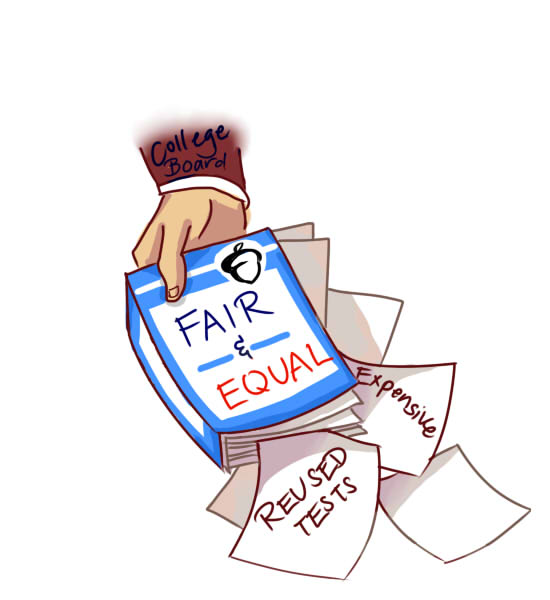
Illustration by Katherine Huang
College Board fails to deliver fair services
The materials in the August SAT were found to have been reused from the international SAT from Oct. 2017, causing outrage from students. This was a poor decision on the part of the College Board, the company that administers the test. It claims to be “dedicated to promoting excellence and equity in education,” but the playing ground they have set for students is unbalanced.
The College Board has been known to recycle their SAT tests for years. Sometimes, tests that have appeared in the country will make a reappearance in the international SAT, and vice versa. This flaw has given rise to a system of student-teachers in Asia that compile booklets known as jijing, which are copies of the test created by interviewing test-takers in the U.S. By allowing this systematic practice of mass cheating to continue, the College Board is doing a great disservice to the patrons they have pledged equity to. Since the SAT is crucial for access to higher education for many students, it should be imperative that the College Board upholds their own standards.
The June SAT administered this year is yet another instance of the College Board’s negligence towards students. Although it was easier than previous tests, the penalties for scoring each question were harsher. Consequently, scores were lower than anticipated, pushing students to retake the SAT. The College Board released a statement on Twitter without so much as an apology to justify its actions in the name of fairness. Instead of touting hypocritical rhetoric about impartiality for all students, the College Board needs to remember that some of them cannot afford to continually retake the SAT. The entirety of the test, including the penalties for each question, needs to be accounted for so that students can receive a level testing experience.
Certainly, the College Board would not be able to get away with its claims of fairness if there was not at least a grain of truth in them. It offers fee waivers to low-income students to guarantee opportunities across economic lines. Supporters of the College Board, then, could argue that by granting every student an opportunity to take the test, it upholds the principle of fairness. However, the issue of equity does not only apply to the accessibility of the test. The jijing booklets illicitly inflate test scores, increase a student’s odds of admittance into a prestigious college, and make the admissions process less fair. This ultimately reflects an indifference towards establishing a fair baseline for students’ college applications.
As it stands right now, the SAT gives certain students unfair advantages. If the College Board genuinely wanted to create a balanced system for college admittance, they would need to consider students first. Promises of fairness do not mean anything unless they are backed up by substantial practice.